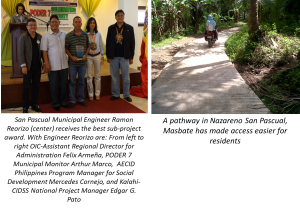 The implementation of Poder Y Prosperidad de la Comunidad (Empowerment and Development of Communities) in Bicol, more widely known as PODER, may have ended, but the projects it completed boosted the development of communities and will now be sustained by the beneficiaries themselves, Social Welfare and Development Secretary Dinky Soliman said as she refers to the project termination last month of PODER in Bicol.
The implementation of Poder Y Prosperidad de la Comunidad (Empowerment and Development of Communities) in Bicol, more widely known as PODER, may have ended, but the projects it completed boosted the development of communities and will now be sustained by the beneficiaries themselves, Social Welfare and Development Secretary Dinky Soliman said as she refers to the project termination last month of PODER in Bicol.
PODER is a partnership between the Department of Social Welfare and Development (DSWD) and the Agencia Española Cooperacion Internacional para El Desarrollo (AECID) which funds projects such as health stations, water systems, farm to market roads, day care centers, classrooms, among others, in poor communities. It uses the community-driven development (CDD) approach employed by Kapit-Bisig Laban sa Kahirapan-Comprehensive and Integrated Delivery of Social Services (Kalahi-CIDSS), one of the three core programs of the DSWD, which enables beneficiaries to plan and decide by themselves the priority needs of their community.
For her part, Mercedes Cornejo, the Program Manager for Social Development of Agencia Española Cooperacion Internacional para El Desarrollo Philippines, said during the closing ceremony of PODER in Gogon, Legazpi City, “This is not the end. This is only the beginning to work even harder in sustaining the community projects.”
With a total grant of PhP 18.8 million, the final phase of PODER funded the priority needs of communities in the municipalities of Juban, Sorsogon and San Pascual, Masbate. The project provided 25 basic community facilities and services to Juban and San Pascual. It previously covered other municipalities in the Bicol region, namely: Manito, Malinao, Legazpi, Bacacay, Sto. Domingo, Tabaco, Tiwi, Malilipot, Libon, Aroroy, Claveria, Minalabac, Presentacion, Paracale, and Sta. Elena. Most of these municipalities also implemented Kalahi-CIDSS.
Connie Carlos, 46 years old, of Barangay Tabuc in Mobo, Masbate said that her village benefited from the two-classroom building constructed through PODER. “The lack of classroom was addressed by the program. Today, classrooms are no longer crowded providing an environment conducive to learning. The project is good because it teaches the villagers to plan and decide on how to improve their community,” Carlos said.
PODER was implemented in the Bicol Region in 2005 funding 231 projects. It also aided Bicol in the aftermath of Super Typhoon Reming in 2006 under its rehabilitation project.
PODER and Kalahi-CIDSS National Project Manager Edgar G. Pato and Region V Assistant Regional Director Felix M. Armeña, took part in the closing activities. ###


